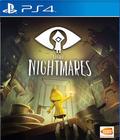Horror fans should probably play Little Nightmares for the sake of the experience, but it isn't a wholly positive one. There isn't much like it on the shelves, and it's a game I'll remember for a while due to its surreal atmosphere and level design, but it's tripped up by poor play mechanics. It's worth checking out, but it's more frustrating than it needs to be.
As the name suggests, Little Nightmares feels like a bad dream you might have had as a child. You're lost and alone in a big, incomprehensible world, being pursued by monsters you can't understand. It's a puzzle-platformer, but the "puzzle" part mostly depends on figuring out and utilizing the game's own bizarre sense of logic.
If you did what I did and started the game without looking up anything about it, all you'd get is that you're a little girl, almost anonymous in a yellow raincoat and hat, who's trapped in the lower levels of a massive, derelict ocean liner. Everyone else aboard is either dead, a traumatized child who you can't do anything for, or a twisted monster who wants to capture or kill you. Your goal is eventually to escape, but as you get further into the ship, the more questions arise. If you look up the game details online, you get a little more insight (the girl's name is Six; the ship is heading for an isolated island resort called the Maw, which serves a very specific brand of clientele), but not much.
I'm a sucker for this kind of underexplained narrative, where you're invited to come up with your own answers based on a handful of clues in the environment. Looked at in its entirety, Little Nightmares feels like a political cartoon as drawn by Charles Addams or Edward Gorey, where a child has to escape from the literal appetites of her barely human oppressors. If it's a metaphor, it's vague, but at least it's also shockingly blunt.
However, the whole thing is brought down by its controls and mechanics. It's playable, and I was able to complete the game without too much difficulty, but when I died, I rarely felt as if it were due to my own mistakes. Instead, they were often the result of the game feeling under-baked, like nobody sat down and played all the way through before it was released.
The controls are the first sticking point for me. On the PlayStation 4, you have to hold down R2 before Six grabs onto anything, such as a handhold or the edge of a platform. You also hold down Square to sprint. To perform a running jump onto an adjacent platform, you have to hold R2 and Square at once, then push X, which requires you to shift your hand into a weird crab-claw position. A lot of games would handle this by simply automating the process, so the player's character would automatically grab a ledge or handhold if you pushed the control stick toward it, and that would make Little Nightmares a lot more intuitive. As it is, I ended up dying a few times because I had to change my grip on the controller on the fly.
More broadly, there are several areas that feel as if they could've used more time in development. Several have an uncooperative camera, where you aren't shown a crucial element you need to progress; one chase scene ends when you reach a door you're supposed to push open, but there's nothing to tell you it's not a wall, and another stealth sequence requires you to avoid the line of sight of an enemy who you're actively prohibited from seeing. You just have to go out in the open and hope for the best.
I also ran into one room where I had to die in order to get an enemy to start a patrol sequence so I could sneak past him, and another chase scene where I died several times because the handhold I needed to grab to escape simply wasn't there at the time I needed it. There's an achievement in Little Nightmares for clearing the entire game in under an hour without dying, and I cannot imagine being masochistic enough to pursue it.
While the controls annoy me, I want to give Little Nightmares credit for avoiding a different sort of issue. For the most part, the puzzles in Little Nightmares are straightforward, with solutions that require some thought and exploration, and once the game establishes its mechanics, they generally don't change. If you can climb on a particular sort of ledge once, you always can; if something looks like you can swing off of it, you can. This is a problem I often have with games of this sort, such as Playdead's Inside, where they'll break their own rules on a whim (or where the solution to a given puzzle is something you could not possibly have figured out on your own, like the bit where you have to get caught by something you've been frantically trying to avoid for the last hour), and I admire Little Nightmares for not doing it. If it's mechanically flawed, its design is still quite sound.
This is a short game, and at $20, it might be a little expensive for a single evening or weekend, but it's worth checking out. There are a few other games in its small genre pool, but Little Nightmares sets itself apart with its level design and surreal atmosphere. Set aside a block of time, try to go into the game as cold as possible, and be ready for a lot of deaths, some of which are gruesome and many of which won't feel fair. It's a sort of dark fairy tale, to go by my experience, and you'll get about 60 unhappy endings before you get to a slightly better one.
Score: 8.0/10
More articles about Little Nightmares










 Little Nightmares will allow you to embark on a grim adventure as you help our hero "Six" in her yellow raincoat escape The Maw – a vast, mysterious vessel inhabited by corrupted souls looking for their next meal.
Little Nightmares will allow you to embark on a grim adventure as you help our hero "Six" in her yellow raincoat escape The Maw – a vast, mysterious vessel inhabited by corrupted souls looking for their next meal.











